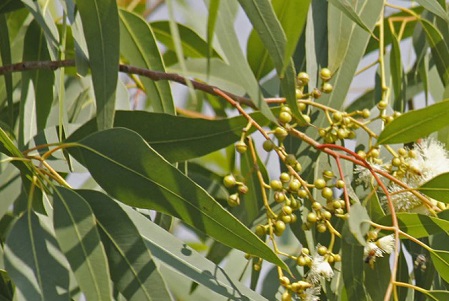Herbs And Phytochemicals: 1.8-Cineole From Eucalyptus Is A Natural Antithrombotic Agent
Nikhil Prasad Fact checked by:Thailand Medical News Team Jun 01, 2024 1 year, 8 months, 4 days, 12 hours, 3 minutes ago
Herbs And Phytochemicals: Platelets are traditionally recognized for their role in hemostasis and coagulation, but recent research has revealed their significant involvement in the immune system. They not only assist in blood clotting but also interact with immune cells to combat pathogens. This dual role is especially crucial during inflammatory diseases, where platelet activation contributes to a phenomenon known as immunothrombosis. Immunothrombosis, while initially a protective mechanism against infections, can become dysregulated and exacerbate conditions such as sepsis, COVID-19, and other inflammatory diseases.
 1.8-Cineole From Eucalyptus Is A Natural Antithrombotic Agent
Understanding 1.8-Cineole
1.8-Cineole From Eucalyptus Is A Natural Antithrombotic Agent
Understanding 1.8-Cineole
1.8-Cineole, a monoterpene derived from eucalyptus oil, is known for its anti-inflammatory and mucolytic properties. It is commonly used to treat respiratory conditions like asthma and chronic obstructive pulmonary disease (COPD). Recent studies have highlighted its potential as a natural antithrombotic agent, capable of inhibiting platelet activation and aggregation, which are key processes in the development of thrombotic disorders.
Mechanism of Action: The cAMP Pathway
The
Herbs And Phytochemicals study conducted by the Technical University of Munich- Germany explored the antiaggregatory effects of 1.8-cineole on platelets. Platelet activity was measured through the expression and release of activation markers like P-selectin, CD63, and CCL5. The results showed that 1.8-cineole effectively prevented platelet aggregation induced by various stimuli, including bacterial infections.
The key mechanism behind this effect was identified as the activation of the adenylyl-cyclase (AC)-cyclic adenosine monophosphate (cAMP)-protein kinase A (PKA) pathway. This pathway leads to increased levels of cAMP, which in turn activates PKA, resulting in the phosphorylation of vasodilator-stimulated phosphoprotein (VASP). The phosphorylation of VASP is a crucial step in inhibiting platelet activation and aggregation.
Antiaggregatory Effects of 1.8-Cineole
1.8-Cineole was shown to inhibit platelet aggregation in response to both classical stimuli and immunological agonists. This included bacteria-induced platelet activation, where 1.8-cineole reduced aggregation and prolonged the lag time of platelet response. It also decreased the expression of several platelet activation markers and the release of granules.
Further experiments revealed that the antithrombotic effects of 1.8-cineole were mediated through the adenosine A2A receptor. Blocking this receptor reversed the effects of 1.8-cineole, confirming its role in the observed antithrombotic activity. This suggests that 1.8-cineole could be a valuable therapeutic agent in conditions characterized by excessive platelet activation and abnormal inflammation.
Implications for Respiratory Diseases
1.8-Cineole's potential extends beyond its known uses in respiratory cond
itions. Clinical studies have demonstrated its efficacy in improving symptoms of bronchial asthma and COPD. It has also shown protective effects against pulmonary inflammation, edema, and vascular endothelium injury in animal models. These findings, combined with its antiaggregatory properties, indicate that 1.8-cineole could play a dual role in treating respiratory diseases complicated by thrombosis.
Comparison with Other Antithrombotic Agents
While many current antithrombotic drugs target specific pathways, 1.8-cineole appears to have a broader mechanism of action. It not only inhibits platelet activation through the AC-cAMP-PKA pathway but also modulates several other signaling pathways involved in inflammation and immune response. This broad spectrum of activity could make it a more effective treatment option for diseases characterized by both platelet hyperactivation and inflammation.
Conclusion
The discovery of 1.8-cineole's antithrombotic effects opens new avenues for its therapeutic use. Its ability to inhibit platelet activation and aggregation through the AC-cAMP-PKA pathway, and its modulation of the adenosine A2A receptor, suggest that it could be a promising candidate for treating conditions like sepsis, COVID-19, and other inflammatory diseases.
Given its established safety and efficacy in treating respiratory conditions, 1.8-cineole offers a natural and potentially more holistic approach to managing diseases involving immunothrombosis.
As research continues to uncover the full scope of 1.8-cineole's mechanisms and effects, it is poised to become an important tool in the arsenal against thrombotic and inflammatory diseases. Further studies, particularly in vivo models, are needed to validate these findings and fully establish its therapeutic potential.
The study findings were published in the peer reviewed journal: Life Sciences.
https://www.sciencedirect.com/science/article/pii/S0024320524003369
For the latest about
Herbs and Phytochemicals, keep on logging to Thailand Medical News.
Read Also:
https://www.thailandmedical.news/news/herbs-and-phytochemicals-german-non-randomized-clinical-trial-showed-that-cineole-from-eucalyptus-can-help-with-common-cold
https://www.thailandmedical.news/news/covid-19-disinfectants-citriodiol-from-eucalyptus-plants-found-in-chiangmai,-australia-and-elsewhere-able-to-destroy-sars-cov-2-according-to-uk-study
https://www.thailandmedical.news/news/covid-19-viral-sepsis-unveiling-the-hidden-dangers-of-coagulation-and-platelet-dysfunction
https://www.thailandmedical.news/news/cleveland-clinic-study-uncovers-dysregulated-platelet-function-in-most-long-covid-individuals
https://www.thailandmedical.news/news/microbiota-derived-corisin-increases-procoagulant-activity-during-sars-cov-2-infection
